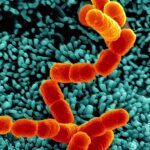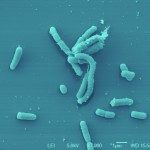Link to Pubmed [PMID] – 17215377
Proc Natl Acad Sci U S A 2007 Jan; 104(3): 997-1002
Listeria monocytogenes is a human intracellular pathogen that is able to survive in the gastrointestinal environment and replicate in macrophages, thus bypassing the early innate immune defenses. Peptidoglycan (PG) is an essential component of the bacterial cell wall readily exposed to the host and, thus, an important target for the innate immune system. Characterization of the PG from L. monocytogenes demonstrated deacetylation of N-acetylglucosamine residues. We identified a PG N-deacetylase gene, pgdA, in L. monocytogenes genome sequence. Inactivation of pgdA revealed the key role of this PG modification in bacterial virulence because the mutant was extremely sensitive to the bacteriolytic activity of lysozyme, and growth was severely impaired after oral and i.v. inoculations. Within macrophage vacuoles, the mutant was rapidly destroyed and induced a massive IFN-beta response in a TLR2 and Nod1-dependent manner. Together, these results reveal that PG N-deacetylation is a highly efficient mechanism used by Listeria to evade innate host defenses. The presence of deacetylase genes in other pathogenic bacteria indicates that PG N-deacetylation could be a general mechanism used by bacteria to evade the host innate immune system.









